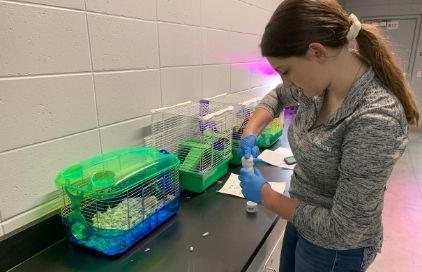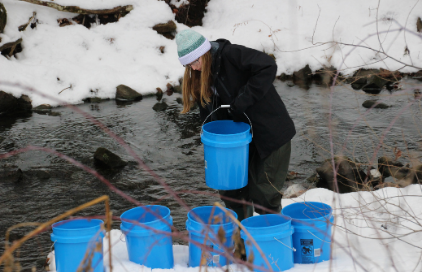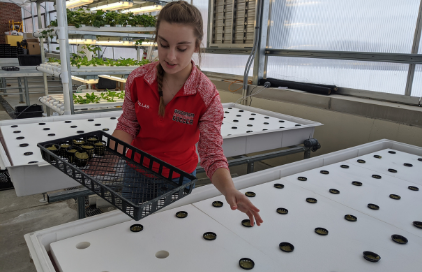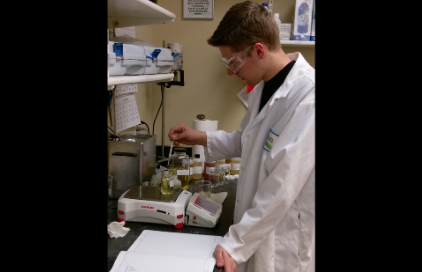Animal Systems (AS)
 |
|
The study of animal systems, including life processes, health, nutrition, genetics, management and processing, through the study of small animals, aquaculture, livestock, dairy, horses and/or poultry.
Examples:
Compare nutrient levels on animal growth
Research new disease control mechanisms
Effects of estrous synchronization on ovulation
Compare effects of thawing temperatures on livestock semen
Effects of growth hormone on meat/milk production |
|
Environmental Service/Natural Resource Systems (ENR)
  |
|
Environmental Service Systems: The study of systems, instruments and technology used to monitor and minimize the impact of human activity on environmental systems.
Natural Resource Systems: The study of the management, protection, enhancement and improvement of soil, water, wildlife, forests and air as natural resources.
Examples:
Effect of agricultural chemicals on water quality
Effects of cropping practices on wildlife populations
Compare water movements through different soil types |
|
Food Products and Processing Systems (FPP)
  |
|
The study of product development, quality assurance, food safety, production, regulation and compliance and food service within the food science industry.
Examples:
Effects of packaging techniques on food spoilage rates
Resistance of organic fruits to common diseases
Determining chemical energy stored in foods
Control of molds on bakery products
Effects of the amount of sucrose used in baked goods
Use of a triangle test in sensory science
|
|
Plant Systems (PS)
 |
|
The study of plant life cycles, classifications, functions, structures, reproduction, media and nutrients, as well as growth and cultural practices, through the study of crops, turf grass, trees and shrubs and/or ornamental plants.
Examples:
Determine rates of transpiration in plants
Effects of heavy metals such as cadmium on edible plants
Compare GMO and conventional seed/plant growth under various conditions
Effects of lunar climate and soil condition on plant growth
Compare plant growth of hydroponics and conventional methods
|
|
Power, Structural and Technical Systems (PST)
 |
|
The study of agricultural equipment, power systems, alternative fuel sources and precision technology, as well as woodworking, metalworking, welding and project planning for agricultural structures.
Examples:
Develop alternate energy source engines
Create minimum energy use structures
Compare properties of various alternative insulation products
Investigation of light/wind/water energy sources
|
|
Social Science (SS)
 |
|
The study of agricultural areas including agricultural education, agribusiness, agricultural communication, agricultural leadership and sales in agriculture, food and natural resources.
Examples:
Investigate perceptions of community members toward alternative agricultural practices
Determine the impact of local/state/national safety programs upon accident rates in agricultural/natural resource occupations
Comparison of profitability of various agricultural/natural resource practices
Investigate the impact of significant historical figures on a local community
Determine the economic effects of local/state/national legislation impacting agricultural/natural resources
Consumer confidence and understanding of food labels
Economic effect of employment rate and meat consumption
|
|